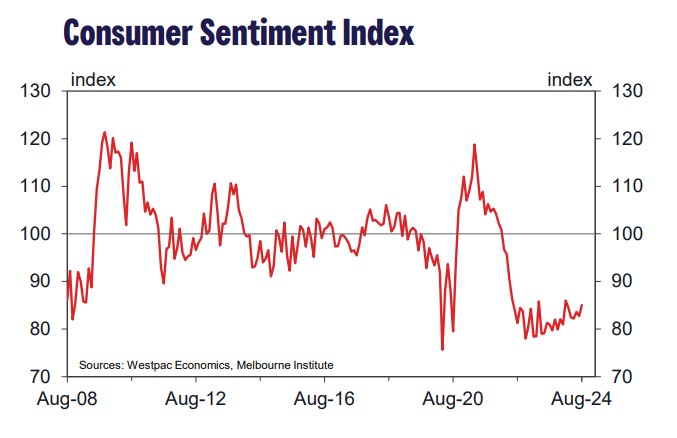Consumers breathe easier after RBA rate hold

Shoppers in Pitt Street, Sydney CBD. (Getty)
Consumers breathed a short sigh of relief after the RBA left interest rates on hold at its August Board meeting, yet sentiment remains weak by historical standards.
The Westpac–Melbourne Institute consumer sentiment index rose 2.8 per cent to 85 in August from 82.7 in July, with support also coming from Stage 3 tax cuts which took effect July 1 and other fiscal measures.
Still, the index has been stuck in the 78 to 86 range for over two years now, indicating deep pessimism, and the latest survey shows cost of living pressures and interest rate concerns are still weighing heavily on households.

The biggest improvement in the month came in views on family finances compared to a year ago. That sub-index surged 11.7 per cent - the biggest monthly gain in nine years (excluding the COVID period) – to a two-year high of 70.9, albeit still a very weak level overall. The monthly rise was particularly strong amongst low-income earners.
Expectations for family finances over the next 12 months also improved, with that sub-index rising 5.1 per cent to 96.8 - the highest level since the interest rate tightening cycle began in May 2022.
Other components showed much smaller, mixed shifts. Consumers were a little more optimistic about the near-term economic outlook but slightly more downbeat on the medium-term prospects.
Clearly the RBA’s decision to leave the cash rate on hold at 4.35 per cent helped to ease concerns about further interest rate rises. Just 45 per cent of consumers surveyed after the RBA decision expect mortgage rates to rise over the next year, the first reading below 50 per cent since May.
The unemployment expectations sub-index rose 3.8 per cent, indicating that more consumers expect unemployment to rise over the next 12 months, but overall sentiment towards the jobs market remains consistent with a gradual cooling in labour market conditions.
Home buyer sentiment deteriorated further in August, underlining affordability challenges in the country’s major cities. The ‘time to buy a dwelling’ sub-index fell 5.8 per cent to 71.4 - a new low for the year. Buyer sentiment dropped to exceptionally weak levels in New South Wales (66.1) but is a little less bleak in Victoria (76.9) and South Australia (76.0).
House price expectations also dipped to levels last seen late last year.
Overall, there’s little in the latest consumer sentiment survey to give the RBA any fresh concerns on the inflation front and we expect the Board to hold the cash rate steady again in September and for the remainder of the year.
To read the full report, visit WestpacIQ.


